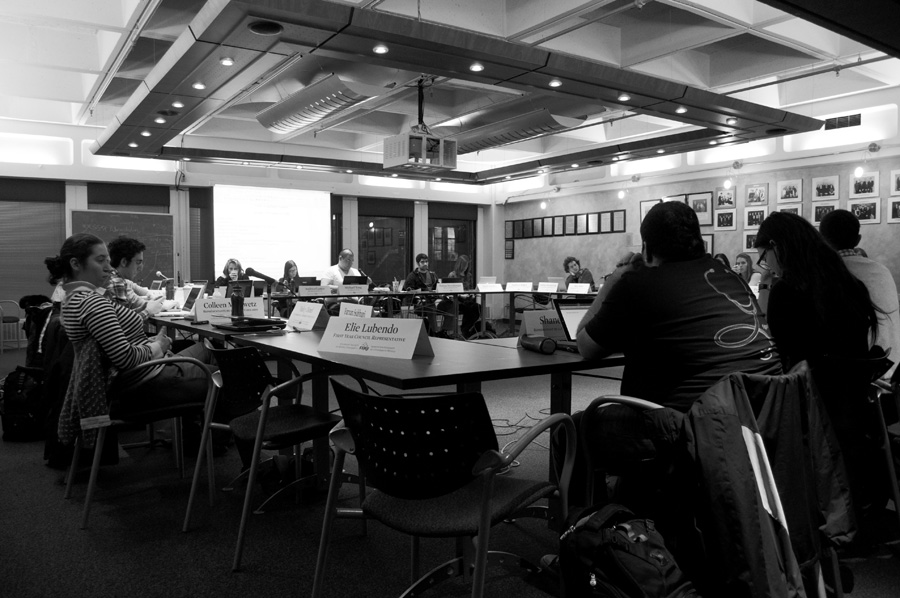Last Thursday, the Students’ Society of McGill University’s (SSMU) Legislative Council voted against a motion condemning Plan Nord and McGill’s investments in the project, but passed a motion opposing military research funded by McGill. Vice-President External Robin-Reid Fraser also presented her report on the SSMU-run education summits last week.
The motion against Plan Nord “as a form of colonialism,” mandated that SSMU cut all ties to groups that support or profit from the implementation of Plan Nord, and pressure the McGill administration to divest from holdings in companies that profit from the plan.
Plan Nord was initiated in 2011 by the former Liberal government of Quebec to economically develop the northern regions of Quebec; this includes investments in mining, logging, and the construction of dams. Many Indigenous communities have spoken out against this plan, and seek to put an end to its continuation.
“Plan Nord violates the James Bay and Northern Quebec Agreement, impeding Indigenous communities’ lands and right to hunt, harvest, fish, and trap in these regions,” the motion reads. “Plan Nord represents a serious concern in all three issues of human rights, social justice and environmental protection.”
Some councillors felt that the terms in the motion were ambiguous, and that the motion was too complex for Council to support in its current form.
“There are a lot of issues here that we can get into [more deeply],” Law Representative Andrew Baker said. “I think that [this issue] is very complex … which makes it problematic to support.”
Ultimately, the motion did not pass.
SSMU Council then debated, and passed a motion advocating for “a campus free from weapons development.” The motion mandates that SSMU oppose any funding of research on weapons, or other facilitators of military violence.
Discussion of this motion focused on whether the SSMU constitution requires SSMU to condemn the university’s investment in such research, and whether it is appropriate to ask McGill to cut off the research of professors who may have devoted their careers to these areas of study.
Some councillors were supportive of the motion.
“The place of a university in society is not to be developing weapons,” Clubs and Services Representative Zachary Rosentzveig said. “We don’t want our university to be funding extremely brutal explosives …. If you want to develop weapons, you don’t work for universities.”
The motion passed, following a successful amendment by Arts Senator Max Zidel, which proposed that Council set up a review board to look into the different areas of research being done by McGill professors and evaluate ethical standards on a case-by-case basis.
“The current motion ignores the nature of technological and scientific research and innovation,” Zidel said. “Do we know for sure that the surveillance technology that is [going to] drones [will] not be undertaken for more noble causes?”
Towards the end of the meeting, Reid-Fraser discussed the report she wrote, following last week’s consultation sessions, where students and other members of the McGill community voiced their concerns about education. Reid-Fraser will submit this document to the Quebec Student Roundtable (Table de concertation étudiante du Québec, or TaCEQ), which will represent SSMU at February’s provincial summit on higher education.
The report makes several recommendations on the topics of accessibility and participation, financing and governance, the role of university in society, out-of-province and international students, and quality of education. Despite the wide range of topics, the report draws several conclusions about general student attitudes at the SSMU summits.
“McGill students have a desire for more information about how universities work, why decisions are made the way they are, and where exactly their tuition money is going,” the report reads. “Students also expressed a wish to collaborate across faculties on issues in which many or all of them have a stake, and to find ways to apply their learning while they are still in school.”
Arts Councillor Colleen Morawetz, however, expressed concern that the recommendations in Reid-Fraser’s report focused too closely on McGill-specific issues. For example, one recommendation calls on McGill to “increase the number of opportunities for practical application of studies.” and another calls for an improved advising system.
Reid-Fraser emphasized that this version of the report is only a preliminary draft, and that she seeks feedback from students and other members of the McGill community.
“I will be taking recommendations that are more broad to go to the Quebec [summit],” she said. “We can have a more internal discussion about the things that are more specific to McGill.”








